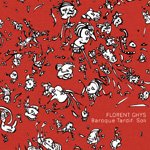By all counts, Florent Ghys seems like a pretty intelligent guy. He’s certainly done his homework, having studied ethnomusicology in his native France at Bordeaux University and Conservatoire and the double bass with Thierry Barbé, the principal bass of the Paris National Opera. He’s also done work in composition masters classes elsewhere in the world, with New York City’s Bang on a Can All-Stars and Milan’s Sentieri Selvaggi. His online bio mentions that he has used samples of weather reports and various TV/radio sources to devise a new tuning of the bass in fifths, and has co-invented a Z-form endpin that changes the balance of the instrument. Which, I imagine, is the kind of fancy talk that would leave most readers of this website as mystified as it has left me.
But his hard work has paid off in respect and admiration from at least a few of the important neo-classical/minimalist circles, as evidenced by his fresh partnership with Bang on a Can’s prestigious Cantaloupe Music label. They’ve got plans to release three of Ghys’ EPs collectively known as Baroque Tardif, and this here Soli is the first in the series.
Ghys’ experience is palpable across these five pieces and 24 minutes. The title track is an impressive arrangement of mathy handclaps and gingerly stabbed bass overdubs, while “Simplement” grafts together guitar and double-bass voices with those of a French man and woman in conversation, sometimes dancing around each other and otherwise locked in a strangely rhythmic kind of argument. “Clignotants” revisits the form of “Soli” with Ghys’ own layered vocal adornments, eroding and accumulating through an extended dialectic of multitracked disintegration and rematerialization. And the closer “Béchamel” is a three-minute exploration of strange, intriguing bass-on-bass dissonance.
But for all of the EP’s theoretical pyrotechnics and classical-meets-found-sound experimentation, the only track I’d ever want to revisit with any regularity is the centerpiece, “Coma Carus.” Here Ghys densely layers a few pianos to induce a hypnotic and richly textured state of ambient unconsciousness, and it makes for a nice midpoint respite from all the mental exercises and challenges of patience that surround it. Ghys’ talents are obvious throughout, and the composer has clearly done a lot of hard work to make this record — but listening to it gets pretty difficult, too. “Carus,” as the real highlight from the proceedings, is a fine reminder that this stuff works best when the pleasure principle and intellectual curiosity are satisfied in equal measure.
More about: Florent Ghys

